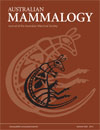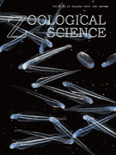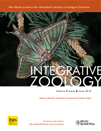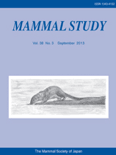
AUSTRALIAN MAMMALOGY
metrics 2024
Pioneering Research in Zoology and Evolutionary Biology
Introduction
Australian Mammalogy, published by CSIRO PUBLISHING, is a pivotal journal in the fields of Animal Science and Zoology as well as Ecology, Evolution, Behavior and Systematics. With its ISSN 0310-0049 and E-ISSN 1836-7402, this esteemed journal has been instrumental in disseminating critical research findings since 2000, and continues to evolve up to 2024. Ranked in the Q2 quartile of both its categories for 2023, it showcases a diverse array of studies that contribute to understanding Australia’s unique mammalian fauna and its ecological dynamics. Researchers, professionals, and students will find valuable insights in its peer-reviewed articles, which are essential for advancing knowledge in these essential scientific disciplines. Located in Australia at UNIPARK, Locked Bag 10, Clayton, VIC, this journal remains committed to fostering scholarly communication within the global scientific community.
Metrics 2024
 0.46
0.46 0.90
0.90 1.00
1.00 30
30Metrics History
Rank 2024
Scopus
IF (Web Of Science)
JCI (Web Of Science)
Quartile History
Similar Journals

Avian Biology Research
Championing conservation through innovative research.Avian Biology Research, published by SAGE PUBLICATIONS LTD, is a leading journal dedicated to advancing the study of avian species through high-quality, peer-reviewed research. With an ISSN of 1758-1559 and an E-ISSN of 1758-1567, this journal has established itself as a vital resource within the fields of Animal Science and Zoology, as well as Ecology, Evolution, Behavior, and Systematics. The journal is currently ranked Q3 in both categories according to the 2023 release of the category quartiles, and it contributes significantly to the global understanding of avian biology, including behavior, physiology, and conservation efforts. Positioned within the competitive landscape of the Scopus rankings, it finds itself amidst a diverse array of research, with medical and environmental implications. As an open-access journal, Avian Biology Research ensures greater accessibility to its contents, fostering disseminative opportunities for researchers, professionals, and students alike. With a publication window spanning from 2008 to 2024, it continues to be an invaluable platform for the dissemination and dialogue of avian research, thereby enlightening future inquiries and driving scientific advancements in this crucial area of biology.

AUSTRALIAN JOURNAL OF ZOOLOGY
Pioneering Insights into Animal Behavior and SystematicsAustralian Journal of Zoology, published by CSIRO PUBLISHING, serves as a premier platform for research in the fields of animal science and zoology, with a profound commitment to advancing our understanding of wildlife and ecosystems. Featuring an ISSN of 0004-959X and an E-ISSN of 1446-5698, this esteemed journal encompasses a wide range of topics relevant to ecology, evolution, behavior, and systematics. For the year 2023, it holds a commendable Q2 ranking in both Animal Science and Zoology and Ecology, Evolution, Behavior, and Systematics, demonstrating its significant impact within the academic community. With a rich publication history spanning from 1952 to 2024, the journal caters to researchers, professionals, and students by disseminating crucial findings and methodologies that contribute to effective conservation efforts and informed ecological practices. Although not an open access journal, it continues to foster collaboration and discussion among scholars in Australia and beyond. Located in Clayton, Victoria, the journal remains dedicated to its objective of enhancing knowledge in zoological sciences and addressing vital environmental challenges.

ACTA ZOOLOGICA BULGARICA
Pioneering Discoveries in Ecology and EvolutionACTA ZOOLOGICA BULGARICA is a prominent academic journal dedicated to advancing knowledge in the fields of Animal Science, Zoology, Aquatic Science, Ecology, Evolution, Behavior, and Systematics. Published by the Institute of Zoology, Bulgarian Academy of Sciences, this journal serves as an invaluable platform for researchers, professionals, and students to disseminate their findings and engage with contemporary issues in biodiversity and ecology. With an established history since its convergence in 2010 and an ongoing publication schedule through to 2024, the journal holds a Q4 category ranking in multiple disciplines, highlighting its role in fostering scholarly communication in these areas despite its recent entry into Scopus-indexed rankings. Although currently not an open-access journal, ACTA ZOOLOGICA BULGARICA remains a key resource for those interested in the latest research and developments, particularly within the ecological and zoological landscapes of Europe and beyond.

Neotropical Biology and Conservation
Exploring the Rich Tapestry of Neotropical LifeNeotropical Biology and Conservation, published by Pensoft Publishers, serves as a pivotal platform for researchers and professionals dedicated to the understanding and preservation of biodiversity in the Neotropical region. This Open Access journal, operational since 2006 and based in Brazil, invites contributions that delve into the complexities of ecology, evolution, and conservation strategies pertinent to the diverse ecosystems of South and Central America. With a commendable 2023 impact factor reflected in its Q3 rankings across multiple categories including Animal Science, Ecology, and Plant Science, it stands as a valuable resource for academics seeking to publish innovative findings and foster dialogue in these critical areas of study. The journal's commitment to open access ensures that knowledge is readily available to anyone interested in advancing the field of neotropical biology and conservation. Join the global conversation and contribute to the vital work of preserving our planet’s rich biological heritage through rigorous research published in this esteemed journal.

RUSSIAN JOURNAL OF THERIOLOGY
Cultivating Knowledge in the Biological SciencesRUSSIAN JOURNAL OF THERIOLOGY is a prominent academic journal published by KMK SCIENTIFIC PRESS LTD in collaboration with the esteemed Moscow State University. As a dedicated platform for researchers in the fields of Animal Science and Zoology, Ecology, Evolution, Behavior and Systematics, and Plant Science, this journal strives to advance our understanding of terrestrial ecosystems and their inhabitants. Although it currently holds a Q4 ranking and ranks within the lower percentiles of its respective categories, the journal's consistent publishing output since 2011 showcases a commitment to facilitating scientific discourse and collaboration. Addressed to a diverse audience of researchers, professionals, and students, RUSSIAN JOURNAL OF THERIOLOGY serves as an essential resource for disseminating valuable insights and fostering future advancements in the biological sciences.

Journal of Vertebrate Biology
Connecting researchers to the world of vertebrate studies.Journal of Vertebrate Biology, a reputable publication established by the Institute of Vertebrate Biology in the Czech Republic, serves as a vital platform for research across the fields of Animal Science and Zoology, Aquatic Science, and Ecology, Evolution, Behavior and Systematics. With its ISSN 2694-7684 and a commendable 2023 Q2 ranking in multiple categories, this open-access journal embraces innovative scientific inquiry and fosters academic discourse. The journal's commitment to disseminating high-quality research is reflected in its Scopus rankings, positioning it within the top quartile in several impactful areas. As it continues to converge its focus until 2024, researchers, professionals, and students alike are encouraged to engage with cutting-edge studies that advance our understanding of vertebrate biology. This publication stands out not only in its scholarly contributions but also in enhancing global awareness of biodiversity and conservation issues.

ZOOLOGICAL SCIENCE
Connecting Scholars to the Heart of Zoological ScienceZoological Science, published by the Zoological Society of Japan, is a leading journal dedicated to the fields of animal science and zoology. With its ISSN 0289-0003, this respected publication has established itself as a prominent source of scientific research, attaining a commendable Q2 ranking in the 2023 category of Animal Science and Zoology. Spanning over three decades, from 1992 to 2024, the journal offers a valuable platform for scholarly articles that explore various aspects of zoology, including ecology, behavior, and evolutionary biology. Although it operates under a traditional subscription model, its contributions are supported by a robust community of researchers and professionals who value its insights. The journal strives to foster academic discourse and insights that drive understanding and conservation of wildlife, making it an essential resource for students and established experts alike. The publishing headquarters located in Tokyo, Japan, further enhances its international reach and influence in zoological studies.

PACIFIC CONSERVATION BIOLOGY
Empowering conservation through rigorous research and collaboration.PACIFIC CONSERVATION BIOLOGY is an esteemed academic journal published by CSIRO PUBLISHING, dedicated to advancing research in the fields of ecology and nature conservation. With a strong focus on the unique challenges and biodiversity of the Pacific region, this journal serves as a crucial platform for researchers, conservationists, and students alike to disseminate high-quality, impactful findings. Operating from Australia, it has become a significant resource since its inception in 1993, navigating through nearly three decades of vital scholarly communication. Ranked in the Q2 category for both Ecology and Nature and Landscape Conservation as of 2023, PACIFIC CONSERVATION BIOLOGY maintains rigorous standards, as reflected in its successful Scopus rankings. The journal plays a pivotal role in addressing pressing ecological issues and fostering innovative conservation strategies, making it an essential reference for anyone involved in environmental science. Access options for the journal facilitate widespread distribution of knowledge, supporting the mission to promote informed decision-making in conservation practices.

Integrative Zoology
Exploring the Depths of Animal BiologyIntegrative Zoology is a distinguished journal published by WILEY, focusing on advancing the field of zoological sciences through the integration of various biological disciplines. With both ISSN 1749-4877 and E-ISSN 1749-4869 identifiers, this journal features research that fosters a deeper understanding of animal biology, ecology, and conservation strategies. As a testament to its impact, Integrative Zoology is recognized within the Q1 category of Animal Science and Zoology in 2023, ranking an impressive #27 out of 490 journals in its field, placing it in the 94th percentile among peers. Published in the United Kingdom, this journal not only serves as a critical platform for novel research but also engages a global audience, inviting submissions that bridge theoretical and practical aspects of zoology. While not entirely open access, the journal remains committed to disseminating high-quality research that contributes substantially to scientific advancements. Through its continuous publication since 2008, Integrative Zoology aims to inspire researchers, educators, and students alike, making it a cornerstone for anyone passionate about the complexities of animal life.

MAMMAL STUDY
Connecting researchers to promote mammalian science and ecology.Mammal Study, published by the Mammalogical Society of Japan, is a leading academic journal dedicated to the field of mammalogy and related biological sciences. Since its inception, it has provided a critical platform for researchers, professionals, and students to share their findings and insights into the diverse facets of mammalian biology, ecology, and conservation. The journal, with ISSN 1343-4152 and E-ISSN 1348-6160, is recognized for its rigorous peer-review process and has attained a commendable Q3 ranking in the 2023 category of Animal Science and Zoology. With an impact factor reflecting its growing influence—ranking 283 out of 490 in Scopus—we welcome contributions that advance the understanding of mammalian species and their habitats. While access to published articles is through traditional channels, the journal aims to reach an even wider audience by fostering greater awareness and appreciation for mammalian research and conservation efforts. The Mammal Study has converged years of insightful publications from 2008 to 2024, solidifying its position as a vital resource in the biological sciences.